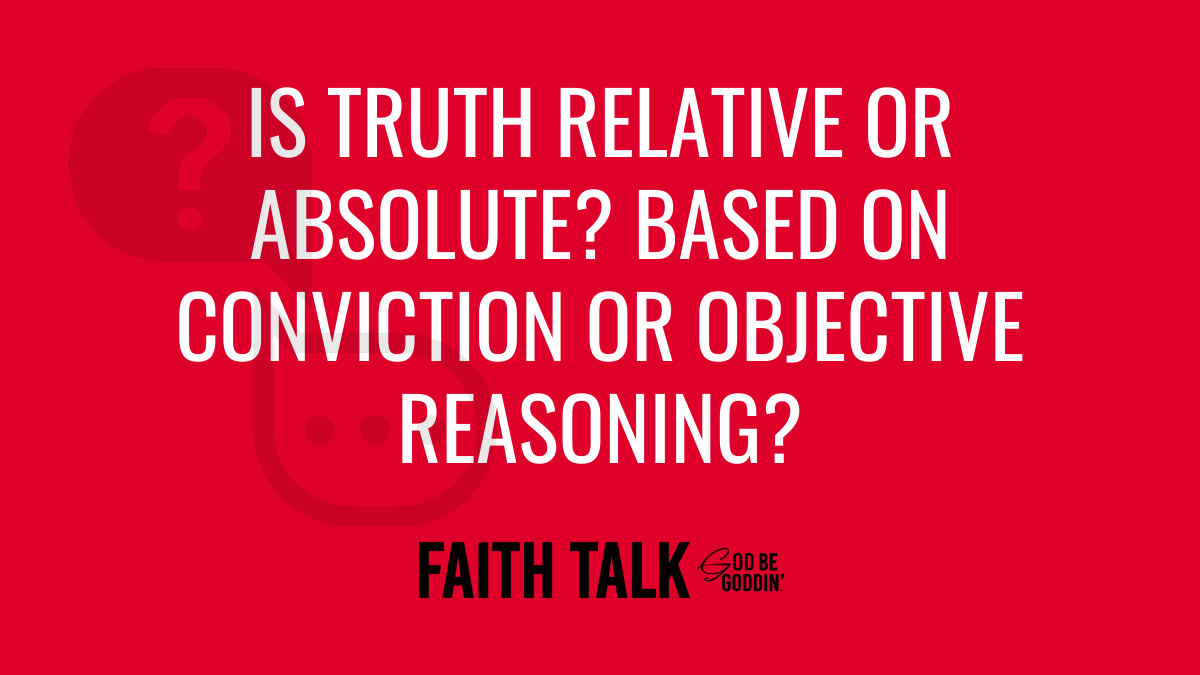Is Truth Relative Or Absolute? Based On Conviction Or Objective Observation?

In today’s “live your truth” era, it’s very on-brand to stand on the idea of ‘what’s true for you isn’t necessarily true for me.’ Some even take the claim that there is no truth at all and truth is just really whatever you want it to be.
While this can sometimes have good intentions in creating welcoming spaces, it raises some questions about what is real truth? And is truth absolute or can it be relative?
Claim: There’s no truth.
Objection: Is that true?
The discussion of relative vs. absolute truth is very layered. This article is an attempt to provide a succinct and fair summary of the topic. It is by no means an exhaustive take for a discussion of such depth.
What Is Truth?
For the upright Christian, truth can be defined as whatever God says is true. This is often observed through His Word (John 17.17) and His ways. In other words, we look to God as the Source of truth (John 16.13, John 14.6, Titus 1.1-2).
What God deems right, we affirm as right. Whatever God deems sin, we also affirm as wrong.
Because our fallen world is so prone to manipulation and sin, truth is the only anchor that we have for knowing what’s right and wrong.
John 14.6 is especially important because it identifies Jesus (God in the flesh) as the Truth. When we choose to believe something, we are really choosing who and what to believe. For the believer in Christ, our truth must point beyond ourselves to something (Someone) higher.
Is Truth Relative Or Absolute?
The short answer is that truth can appear relative in light of the context and circumstances involved, that is, circumstantial truth.
For example, the question, “is there a hurricane,” can be true for certain locations, all locations, or no locations. It depends on where you are. However, when we ask the question, “is there a hurricane,” the underlying assumption (context) is understood to mean locally wherever we are at the present moment.
Notice here that the truth itself is not so much “relative” as is the circumstance that the question clarifies. “Is there a hurricane?” is either true or not (by objective observation). But the circumstance, in this case, the location, is the relative factor that informs whether that truth is applied.
Truth in a moral sense, that is, moral truth is what we would call absolute truth.
For example, the answer to the question, “Is sex outside of marriage (fornication) following the ways of God?” is no for any and all times, circumstances, and cultures. While some cultures or even Christians today will not acknowledge this as a sin [against the ways of God], it doesn’t change the absolute truth (1 Corinthians 6.18) that it is a sin. Because for the believer, our truth is informed by God Himself.
Understanding circumstantial vs. absolute truth begins with properly defining the question being asked.
Is Truth Based On Conviction?
Christians often cite Romans 14.22-23 as an example of truth being based on one’s convictions or a “relative” truth.
Romans 14.21-23 NIV: It is better not to eat meat or drink wine or to do anything else that will cause your brother or sister to fall. So whatever you believe about these things keep between yourself and God. Blessed is the one who does not condemn himself by what he approves. But whoever has doubts is condemned if they eat, because their eating is not from faith; and everything that does not come from faith is sin.
The writer of Romans, Paul, is speaking to Christians who are arguing about whether or not something (food in this case) is a sin — based on the dietary Jewish customs.
And herein lies the distinction about convictional truth (based on personal conviction). As the ultimate Authority, God decides if something is ultimately right or wrong (a sin). Our personal conviction, while valid, does not supersede God’s standard of right and wrong.
If your truth doesn’t match God’s truth, switch truths.
When evaluating whether something is right or wrong as a matter of personal conviction, we must first filter our view through whatever God and/or Scripture declares about the matter.
Truth Based On God’s View
In the case of Romans 14, the greater context of this issue reveals God’s stance on the matter of the Jewish dietary laws, among other practices, that are being debated. It’s also worth mentioning that much of this debate at the time involved new Christians who did not/could not yet accept that all foods had been declared clean.
Part of their acceptance of this also had to do with the old covenant in that they held certain dietary practices as a means to obtain right standing with God or to remain “clean” and pure before Him. Under the new covenant, because we’re made right through Jesus, these practices would not be required to obtain right standing.
Romans 14.14 NIV: I am convinced, being fully persuaded in the Lord Jesus, that nothing is unclean in itself. But if anyone regards something as unclean, then for that person it is unclean.
Romans 14.14 (and earlier in Mark 7.15-19 by Jesus) reveals God’s truth on the issue that all foods were clean and permissible to eat. But with one condition.
While all foods were declared to be permissible, as a matter of conscience, Paul instructs them to choose whether or not and what to eat (Romans 14.22-23). Paul urges the believer to not violate their conscience as a matter of faith, in eating something they felt uncomfortable doing. Because violating their conscience would be considered sinful.
So upon further context, there were really two questions being raised here: 1) Are certain foods unclean (sinful)? And 2) Are you personally convicted by eating certain foods?
Understanding how to apply truth, convictional or absolute, begins with understanding and clarifying the question being asked.
Whether or not you’re personally convicted one way or the other doesn’t overrule God’s absolute truth, which in this case, is declaring all foods clean. As a separate but related issue, however, Paul implores us not to violate our conscience as sinful consequences will ensue (Romans 14.13; 14.23).
Personal Conviction Is Not A Get Out Of Jail Free Card
It’s important to note that Paul prefaces this entire discussion, including personal choice (based on conviction) of what’s acceptable to eat, by acknowledging that each of us will still have to give an account to God [for our free will choices] (Romans 14.10-12).
Or in other words, just because something is permissible, doesn’t mean it’s good or best for me (1 Corinthians 10.23).
In this scenario of what’s acceptable for eating, all food has been declared to be clean and thus permissible. However, if I’m a diabetic, consuming large amounts of sugar is not good for me nor is it good stewardship of my body. For this, I will have to give an account to the Lord for as well those and that which I am responsible for that require the stewardship of a healthy body.
Outside of food-related matters, Paul’s instruction here about certain matters being of a personal choice is not a sanctioning of any and all actions to engage in as long as it’s acceptable to us or aligns with our personal convictions.
Some Christians have erroneously used Romans 14 to justify behavior that agrees with their personal conviction or truth, but not God’s absolute truth.
Sin will always be unacceptable to God. Notwithstanding, our personal convictions can be misleading (Jeremiah 17.9). We can be convicted by something that God approves of or not convicted by something that God disapproves of.
God’s Commands To Us Individually
Like with the nation of Israel, it’s possible for God to give us a direct command that would be sinful for us to disobey (ex. don’t take that job) but not sinful for someone that He didn’t give that direct command to. In this scenario, taking the job in and of itself is not the sin but rather our disobedience to a direct command from God. We’re accountable for what God personally directs us to or away from.
We are always accountable to God’s commands in Scripture first, and second to whatever He personally reveals to us. Remember that God will never personally give us a command that is inconsistent with His ways or found in Scripture.
Finally, as a matter of personal conviction, Paul also admonishes Christians not to brandish or be careless about their free will permissible choices so as to confuse or cause other Christians, especially new believers, to fall in their faith.
1 Corinthians 8.13 NIV: Therefore, if what I eat causes my brother or sister to fall into sin, I will never eat meat again, so that I will not cause them to fall.
Our Convictions Follow Our Spiritual Maturity
Some of the new Christians in Romans had a hard time accepting their new freedom in Christ as it relates to dietary practices.
This might be sorta kinda similar to today in how it’s more acceptable to dress down for a church service whereas, in the past, this would’ve been strictly frowned upon. A Christian that might remember the old way may feel personally convicted about dressing down even though it’s no longer generally frowned upon. Of course, this was a matter of man’s customs and not necessarily a law or command from God that would incur sin.
The point is, there are some freedoms that a new or even renewed Christian might be reluctant to embrace in their new walk. Remember that Satan is also called “the accuser” (Revelation 12.10) and “father of lies” (John 8.44). He celebrates getting Christians to feel bad about something that God has declared good so as to weigh us down with condemnation. We must be knowledgeable and wise about what God says about how we’re to live so that we’re not consistently baited into guilt.
Likewise, for the new or even renewed Christian, there are some old ways that God has to grow them through in their new walk.
While our inner man is changed forever upon receiving salvation, our outer man (behavior) is still a work in progress. As we spiritually mature, we grow into a better understanding and mirroring of Jesus’s life that continuously rounds off our rough edges — making us look more like Him each day.
Evaluating Circumstantial and Absolute Truth
God’s absolute truth on a matter informs us of what we should believe and how to proceed. Only then, as a matter of personal conviction, should we decide whether or not it is something that we should do. Our follow-up should always be consistent with the ways of God.
If God declares something sinful, either for all mankind or a personal command, our personal conviction can never overturn that.
If God declares something is not sinful, and therefore permissible, we can decide as a matter of personal conviction whether or not we should do it. Remember: Just because we can do something doesn’t mean that it’s always good for us. Also, a personal conviction is for us and not all of mankind. We do not get to call something a sin that God has already declared not a sin or clean.
If God declares a command for us to do or be, personally or for all of mankind, we are to obey Him without question or delay. Our personal conviction can never overturn God’s command unless He gives conditions for doing so.
Remember: God’s absolute truth will always be consistent with the ways of God as observed through Scripture.
You don’t have to always give someone your opinion. Give them the Word of God.
Does God Change?
When we talk about truth, we inevitably come to the question of “does God ever change?” Yes and no.
Malachi 3.6 famously declares these words from the Lord about Himself: “I the Lord do not change…” References like this refer to God’s nature and character that remains consistent.
God doesn’t change but He does change the way that He responds to us or even a course of action (ex. Exodus 32.14).
In Genesis, God detailed His plan for man and woman to marry and not divorce (Genesis 2.24). In fact, for many years divorce was considered a sin and against the ways of God. Later on in the New Testament, we see Jesus (God in the flesh) acknowledging divorce now being an option, under certain conditions (Matthew 19.7-9).
Jesus’s words, “Moses permitted you to divorce your wives because your hearts were hard. But it was not this way from the beginning…” further underscores how God can allow something to be permissible though it’s not His desire or original intent.
What About The Levitical Laws On Unclean Food?
Another example of God changing the way that He responds to us are the Levitical laws on dietary restrictions (Leviticus 11). Once given to the nation of Israel for the purposes of setting them apart (during that time period), these were later removed, and declared all food to be clean (Mark 7.19).
The Nature And Character Of God
The ways (nature and character) of God do not change. Though there are new angles or perspectives of Him that we step into the revelation of.
New information about God doesn’t necessarily mean He has changed who He is. His sovereignty spans an infinite spectrum.
As followers of Christ who love Him, we don’t just seek truth for the sole purpose of wanting to be right. We seek truth so that we can fulfill the desires of His heart.




Comments ()